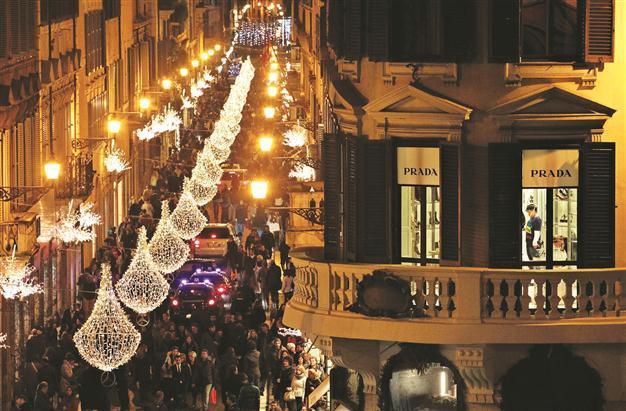Crisis pushing historic Rome shops to the brink
ROME - Agence France-Presse

People walk below Christmas lights at Spain Square in downtown Rome, the Italian capital city, over the weekend. Shopkeepers held a rally in Rome last month in which they symbolically handed over the keys to their shops in protest. REUTERS photo
A famous bookshop, a historic bakery and an olde-worlde hat store: all historic shops in the Eternal City that are failing the test of time as Italians feel the pinch from a deep financial crisis.“I’ve lost hundreds of thousands of euros. I’m quitting,” said Rodrigo Dias, owner of Libreria Croce, a book store that was the biggest in Rome when it opened in 1945 but was forced to shut down this month.
“In October revenue here was down 50 percent compared to the same month a year ago. We’ve been in trouble since the crisis of 2008. But 2011 has been the worst year yet and next year will be even worse,” the 70-year-old said.
“In 40 years in the business, I’ve never seen it this bad,” he added.
Dias said he was offered an interest-free loan to keep his business alive by “suspicious types”. Local business associations warn that the current financial climate favours mafia groups, which have high levels of liquidity.
“Who knows what they would have got me into. I resisted,” Dias said. The fear among many shopkeepers is that Rome’s city centre will end up with a cluster of chain shops and restaurants aimed at tourists, while Italians go and shop in some of the large malls in the city’s outskirts.
Local associations say that seven small businesses a day in Rome and the surrounding region are going belly-up, with rents on the rise, bank financing ever more elusive and consumer spending on the slide for months. A survey by the retailers’ group Confesercenti found that 64 percent of Italians were planning to cut back on their Christmas shopping this year and 22 percent will reduce their spending by more than half from last Christmas.
“This is an unprecedented crisis that has been underestimated by politicians,” said Lorenzo Tagliavanti, leader of the National Confederation of Artisans in Rome.
Ban on large retailers
Shopkeepers held a rally in Rome last month -- one of the first demonstrations under the new government of Prime Minister Mario Monti -- in which retailers symbolically handed over the keys to their shops in protest. “The truth is this crisis has been devastating,” Tagliavanti said.
Rome city hall responded last week with a series of proposals to restrict the number of giant shopping malls allowed within Rome’s city limits -- there are already four and 16 more are planned in the coming months.
It also confirmed a ban on large retail hubs in the city centre. “Our fundamental value is the small and medium-sized enterprise sector which helps keep neighbourhoods alive,” Rome mayor Gianni Alemanno said.
But businesses say only a complete ban on new shopping centres would help save local shops and warn they will come under pressure if Monti hikes value-added tax in a bid to reduce Italy’s sky-high public debt.
It’s not just shopkeepers who are under threat but a slice of history in the city of La Dolce Vita where a day out shopping used to include visits to some of the many local artisans making clothes, furniture or delicacies.
The closure at the end of last year of the Metropolitan cinema on Rome’s main thoroughfare, Via Del Corso, was a blow to many local residents but went ahead anyway. It was bought up by clothes chain Benetton.
Another popular spot is Forno -- a traditional bakery on the ever-busy Campo de’ Fiori square. But owner Dino Bartocci, 64, says the streams of regular customers he gets are not enough because he is having trouble accessing credit.
“I applied for a 20,000-euro loan but they were asking for so much paperwork that I just said no. If you think of the strong guarantees I had and the fact I’ve been with the bank for 40 years, it’s just amazing!” he said. “We’re overwhelmed by bureaucracy, we can’t take it any more,” said Bartocci, who heads the Italian bakers’ association. He added: “But with a bit of help we can recover and if small businesses recover, Italy recovers.”
















